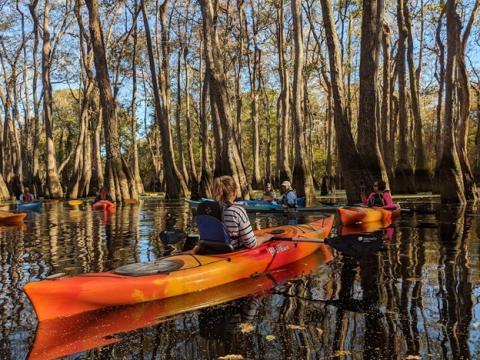Insights from the 2021 National Extension Tourism Network Conference

UNH Cooperative Extension’s Community and Economic Development team supports communities through a broad range of programs and offerings. One of our specialty areas is tourism, and we’re not alone: across the country numerous Extension offices have specialists and educators working on destination development, agritourism planning, sustainability initiatives, and workforce training, among other tourism project areas. Collectively, we embrace opportunities to share ideas, network, and collaborate, and last month we did just that at the biennial conference of the National Extension Tourism Network (NET), held in Savannah, GA. Around 100 Extension staff, Sea Grant collaborators, and other tourism professionals came together for this year’s focus on “Navigating the Uncharted,” with an emphasis on how Extension tourism programming can best serve stakeholders’ needs.
Themes and trends in focus
At this gathering, NET members and presenters from across the United States represented a remarkably diverse range of interests and projects. Reflecting the conference’s Extension and Sea Grant roots, several presentations examined growing interests in agritourism or highlighted recent shellfish tourism development efforts (happening from Maine to Georgia!) and marine sustainability messaging strategies. While practitioners shared some innovative outreach and promotion initiatives, there were concerns about how such programs might be deployed, as workforce shortages have been on the minds of Extension professionals across regions both rural and urban. Creating a more robust workforce was the focus of a large multi-state initiative focusing on the retail sector, which highlighted the impacts of partnership programs in rural areas and left many attendees feeling hopeful.
In light of the many businesses adaptations made during the COVID-19 pandemic, practitioners shared strategies for improving visitor safety protocols and helping tourism businesses develop enhanced risk management plans. A common theme expressed was that many of the strategies and procedures implemented as COVID responses seem to have merits and utility beyond the pandemic. This echoed sentiments I’ve heard lately in New Hampshire: for instance, some ski areas are opting to continue advanced reservation-only ticketing systems, as it helps them maintain comfortable carrying capacity and safer visitor experiences. What we’ve been hearing, widely, is that COVID was the nudge that made businesses employ certain strategies that they have found favorable to their overall operations going forward. Silver linings!
Highlighting the work of UNH staff
In total, we had four attendees from UNH (three from Extension) attend the conference either in person or online, which allowed us to regroup with our frequent collaborators from other states such as West Virginia and Vermont. Two of us from UNH Extension presented in the peer-reviewed conference sessions. Sullivan County Field Specialist Penelope Whitman shared an overview of the destination development project she has helped to spearhead in her county, uniting cities and towns such as Claremont and Newport in a regional branding and promotion strategy. The audience was particularly curious to hear about community-based strategies such as storymapping and collaborative logo development, and how these elements can highlight a region’s favorite yet often overlooked assets. (You can read more about this project on pages 12-15 of the 2021 issue of Radius Magazine). In my own presentation, I shared ideas for creative and participatory research and assessment techniques for engaging residents in tourism planning and development. Using a case study from my prior international research in post-conflict Bosnia and Herzegovina, I aimed to draw parallels to issues arising in my region of New Hampshire and encouraged attendees to question their pre-existing assumptions about residents’ perspectives and preferences.
Place-based learning

Experiential learning is undeniably important to Extension educators. All in-person attendees participated in “mobile workshops,” which included opportunities to kayak through inland floodlands and learn about ecotourism development (see photo), tour Tybee Island to hear about coastal resiliency projects, or visit marine ecosystem facilities to observe the region’s oyster industry. In the evenings, we were able to experience Savannah’s growing culinary scene, sampling regional specialties such as the famous Low Country Boil. The adaptive reuse of historic buildings by Savannah College of Art and Design, inns, restaurants and other businesses provided a thought-provoking cityscape for considering the possibilities of tourism.
We’d like to give a big “thank you!” to Bryan Fluech and all those from University of Georgia Extension/UGA Sea Grant who put on a truly inspirational and enjoyable program. We’re looking forward to NET 2023 in Wisconsin, where we expect some exemplary opportunities to further explore themes of rural tourism development, agritourism, and – hopefully – cheese tourism!
Wondering what UNH Extension’s tourism specialists might be able to do for your community? Don’t hesitate to get in touch! From established programs like First Impressions and Downtowns & Trails to customized offerings, there are a plethora of ways our team can help your community reach its destination goals. Email jada.lindblom@unh.edu or penelope.whitman@unh.edu for more information.
